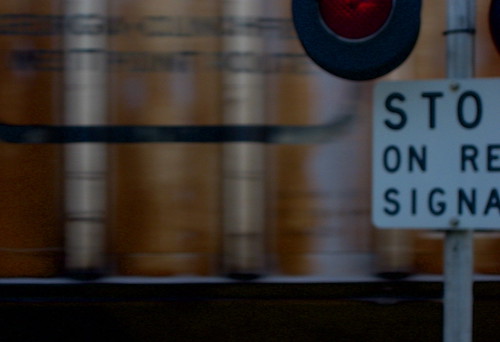
A Train
Late: the dog’s philosopher-king inspect of the immobile air, the pre-thundershower leaf-droop, the parcel of books unread stack’d up everywhere. A mostly pleasant muddle of the half-finish’d, the partial, the inchoate: I am in my element!
—
Loud coursing greenbottle stirring the air, alighting in the lamp’s innards. When it buzzes up and out again, bouncing against the ceiling, the dog snaps. Goes aimless, nonchalant-perplex’d.
—
Lazy reading: thinking, after a whole novel (The Wild Palms) of Faulkner’s tagged “jonquil sky”—what color is that?
—
Two days running: bumping into Boileau! (On the second occasion: with Tynianov.) Who’s Boileau? The seventeenth century sheriff of Parnassus! (Who’s the sheriff of Parnassus aujourd’hui?)
—
For hands (yesterday, Frank O’Hara’s stubby fingers), go to a dancer (Carolyn Brown, in Chance and Circumstance: Twenty Years with Cage and Cunningham). Talking about a painter (Rauschenberg)’s hands: “. . . almost awkward in repose, they were eloquent, masterful hands, agile and cunning as a cat whether hammering a nail, opening a can of chili, clutching a double Jack Daniel’s, gripping a paintbrush, or leafing through a magazine. They’re all fingers—extremely long, slender, bony fingers—and thumbs, widely flaring double-jointed thumbs bespeaking (truthfully) his outrageously generous nature.”
—
Carolyn Brown’s precise limning of Merce Cunningham: “He was slender and tall, with a long spine, long neck, and sloping shoulders; a bit pigeon-breasted. There was a lightness of the upper body which contrasted with the solid legs, so beautifully shaped, and the heavy, massive feet. The body was a blue-period Picasso saltimbanque . . .”
—
Theory of how one’s body mimics the art one loves. The heroically abstract body. The Kirchner body.
—
Andrea Zanzotto (who, under the word “January” writes “Now brutalized by the industry of the snow”) talking about writing, and writing a book: “It is not that I write every day; on the contrary, I go for long periods without writing anything, in the dullest wretchedness. And yet I “ponder”; when verses, words—individually or in little clusters—begin to hatch and “grow fond of each other,” I transcribe them, always by hand, using pens that give me the sensation of almost designing on paper, or even of perforating it, traversing it. I then accumulate this material in drawers, not even clearly knowing what it is. When there passes that period that roughly corresponds to a “grande mese” [literally, “big month”] of life, I conduct a sort of examination, a reconnaissance of this material, and suddenly the outline of a book appears to me. Then the title emerges, which for me has great importance; the semantics of the title are telling and decisive. The title is born for me as the singling out of structure in the midst of a vast assemblage.” Which comes close to my experience, that sense of being “took up” by the “unbidden activity” of words coalescing, clumping up—riding that for whatever measure one can—“big month”—and, later, in the doldrums again, pawing at the satchel-full of “completely foreign” material—“I wrote that?”—and seeing how it “fits.”
—
Love for the idea of the box of scraps, tidbits, materiel for “the joinery”—Wittgenstein’s Zettel, Duchamp’s Boîte Verte, even something so scrappish and unintentional as Scott Fitzgerald’s The Crack-Up.
—
Writing which escapes (in order to escape) “intention”: that is all. Wittgenstein: “I tell someone: ‘I’m going to whistle you the theme . . .,’ it is my intention to whistle it, and I already know what I am going to whistle.
It is my intention to whistle this theme: have I then already, in some sense, whistled it in thought?”
—
Lazy writing: whistling the theme already whistled “in thought.” (Ask the sheriff.)

Ernst Kirchner, “Artillery Men in the Shower,” 1915
